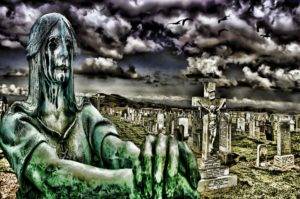When the funeral has ended, and when you come home from work to be greeted by silence, and the realization the rooms once filled with laughter are soaked with tears. The fog has lifted, and now it’s time to grieve.
When I expressed my grief early on, I knew I was making people uncomfortable. So when I would feel my throat tighten, my temples begin to throb as the grief storm arrived. I’d quietly close my office door, lay my head on my desk and the full eruption of tears, snot and gasping for air like I was drowning came flooding in. I felt so alone, not only because when I went home after work, there was no one there waiting for me, but also because I had to hide my hurt from everyone.
Except for my assistant coach who shared an office with me. She would pull my hair back so I wouldn’t drool on it. She was a champ.
As the fog continued to lift and the vision of living alone became more evident, I realized my grief didn’t just end with missing my husband. It infected every part of my life. And it still does, almost five years later.
Author, Comedian, and Widow, Kelley Lynn, wrote about how the way we watch TV changes when our spouse dies. And it’s true. I don’t have a hand to hold and someone to laugh along with. So in my first year of widowhood, I got rid of cable. I didn’t see the point.
The way I dined changed too. I used to create these fantastic meals with my husband, and we would do hours of prep to make tasty desserts or involved dinners. But when he died, I ordered out more, tried to throw a bunch of ingredients into a bowl and hope for the best.
Even today, I don’t bake, I don’t meal prep much like I used to. I tend to grab what is available and throw it into a bowl. The joy washed away when the funeral home lifted him out of my apartment.
I can’t adequately voice these things publicly unless I’m writing it down. Because of this, the widow boards, and blogs are so valuable for me to express how I feel. When the fog lifted and I realized the magnitude of losing my husband and how it impacts my entire life– including friendships, family dynamic, work ethic, etc.– I needed to know if this was unusual. And I was embarrassed about how I felt. But when I learned others were experiencing it too, the pain felt normal.
And there is now the longstanding rhetorical question– Does time heal all wounds? Or do you become normalized to the pain over time?



I truly wish I could tell you time heals…..it does not! You do learn to adapt out of sheer necessity to survive and also in order put one foot in front of the other one day at a time. I have been putting one foot in front of the other for 5711 days.
Feeling alone & hiding the hurt…after 15 months it’s still like that. I wish people would just stop asking if I’m ok. I hate to lie, but it’s simpler than breaking down. I save that for the evening when I come home to our empty house. I’s like all the color is gone. Not a lot of joy found except when the kids/grandkids come by. Even that is bittersweet…he loved those babies SO! After 25 years together and him being 11 years older, I knew I’d probably be without him one day. That day came too soon. He was one week shy of his 69th birthday and I’ve never felt such pain and emptiness. Everything does change…EVERYTHING! I don’t cook much anymore…don’t care to go shopping because I would always get him something. His coffee cup, his big recliner, his beloved fishing gear…him.
Adjusting to this new life seems robotic. Necessity takes over at some point and you get done the things “life” requires. The tears, the hurt, the emptiness, the longing…just don’t stop. I don’t know what “normal” is any more.
Thank you for sharing. I don’t feel so “alone”. Prayers for you!
Time does not heal the pain at all, we adapt to it to survive. My husband my twin flame died almost 3 years ago and the magnitude of emotional pain has not and will never lessen.
This: “It infected every part of my life” got me. I’m 5 years out and I’m not sure that time heals that kind of pain and loss. It seems like all other areas of life you just learn to accept a new normal and reconcile it. Much hugs to you. Thank you for sharing!